As a dog owner, you may find yourself wondering if it’s safe to share your beloved mac and cheese with your furry friend. After all, mac and cheese is a popular comfort food that many of us enjoy. However, when it comes to our pets, it’s important to consider their unique dietary needs and potential health risks.
While there is no definitive yes or no answer, it’s crucial to be mindful of the ingredients found in mac and cheese and their impact on dogs. In this article, I will explore the safety of feeding mac and cheese to dogs, the risks associated with it, and provide alternatives that are healthier and better suited for our canine companions.
Before we dive into the details, let’s take a closer look at why mac and cheese may not be suitable for dogs.
Key Takeaways:
- Feeding mac and cheese to dogs is not recommended due to potential health risks.
- Mac and cheese contains ingredients that may be harmful to dogs, such as high fat and sodium content.
- Dogs with gluten and dairy intolerances may have adverse reactions to mac and cheese.
- There are healthier alternatives, such as dog-friendly fruits, vegetables, and lean protein options.
- Consulting with a veterinarian is crucial before introducing any human food into your dog’s diet.
Why Mac and Cheese is Not Suitable for Dogs
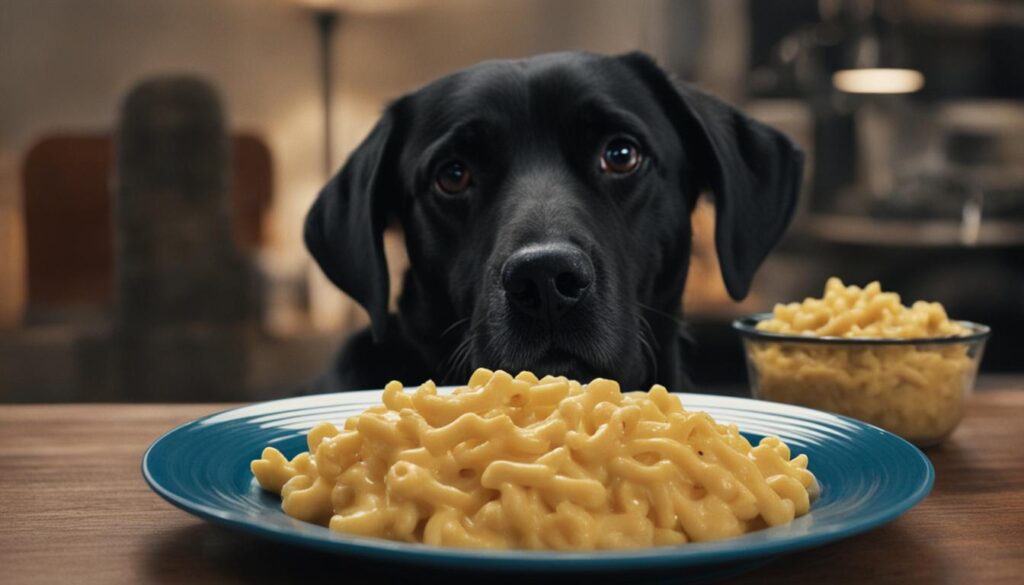
When it comes to feeding our furry friends, it’s essential to be aware of what foods are safe for them to consume. As much as we may love mac and cheese, it is not a suitable option for dogs. Let’s take a closer look at why mac and cheese is not recommended for our canine companions.
Traditional mac and cheese contains ingredients that can be harmful to dogs. One of the main concerns is the high fat and sodium content in this dish. Dogs have different dietary requirements than humans, and their bodies are not designed to handle excessive amounts of fat and sodium. Consuming mac and cheese can lead to weight gain, digestive issues, and an increased risk of conditions such as pancreatitis.
Furthermore, dogs can have specific intolerances and sensitivities to certain ingredients found in mac and cheese. Gluten and dairy are two common allergens for dogs, and these ingredients are typically present in traditional mac and cheese recipes. Dogs with gluten intolerance may experience gastrointestinal discomfort after consuming gluten-containing pasta in mac and cheese. Similarly, dogs with dairy intolerance can suffer from digestive upset and other adverse reactions when exposed to dairy products like cheese.
It is crucial to prioritize our dogs’ health and well-being by avoiding potentially harmful foods like mac and cheese. Instead, we should focus on providing them with a balanced and nutritionally appropriate diet. If you are unsure about what human foods are safe for your dog, it is always best to consult with a veterinarian for guidance.
“Feeding mac and cheese to dogs can be detrimental to their health due to the high fat and sodium content, as well as the potential gluten and dairy intolerances that dogs may have.” – Dr. Sarah Rodriguez, Veterinarian
To illustrate the nutritional content of mac and cheese and its potential effects on dogs, let’s take a look at the table below:
| Mac and Cheese Ingredients | Amount per Serving |
|---|---|
| Fat | 20 grams |
| Sodium | 600 milligrams |
| Gluten | Contains wheat-based pasta |
| Dairy | Contains cheese |
Please note that these values are approximate and can vary depending on the specific recipe or brand of mac and cheese. It’s always important to check the ingredient list and nutritional information.
It’s clear that mac and cheese is not an ideal choice for our four-legged friends. Instead, we should focus on providing them with dog-friendly alternatives that are both delicious and nutritious. There are plenty of safe and healthy treats available for dogs, such as fruits, vegetables, and lean proteins. These options can satisfy their cravings without compromising their well-being.
Remember, our dogs rely on us to make responsible choices when it comes to their diet. By avoiding foods like mac and cheese and opting for canine-approved alternatives, we can help ensure their long-term health and happiness.
When Can Dogs Safely Eat Mac and Cheese
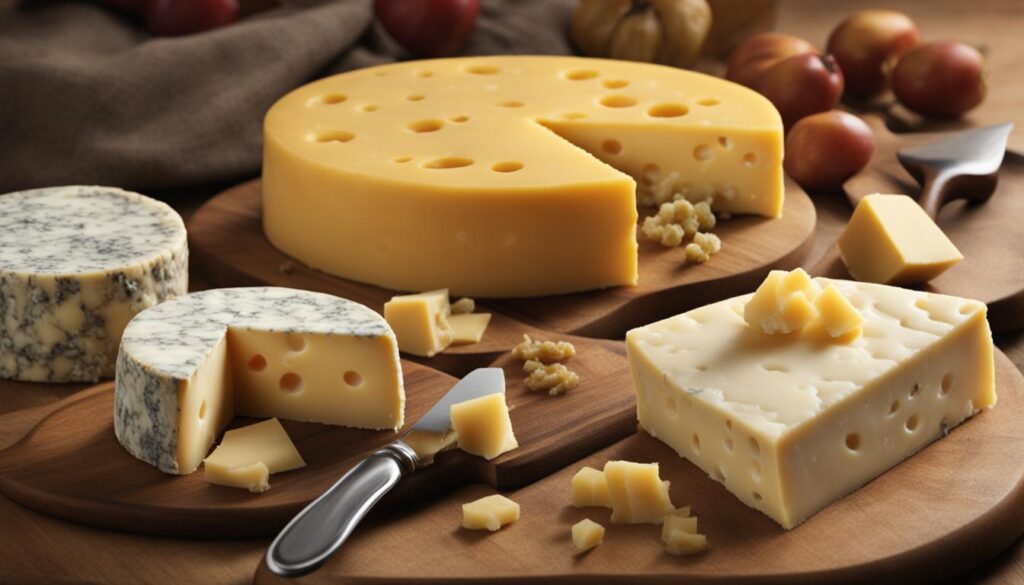
If your dog does not have any intolerances or allergies, they could enjoy a small portion of plain mac and cheese made with dog-safe cheese options such as cheddar or mozzarella. It is essential to ensure the mac and cheese has minimal salt and seasonings, such as garlic and onion powder. However, even in these cases, it is advisable to limit the serving size due to the high fat content.
Here’s a table outlining suitable cheese options and their nutritional content:
| Cheese Option | Nutritional Content |
|---|---|
| Cheddar Cheese | High in protein, calcium, and vitamin A |
| Mozzarella Cheese | Lower in fat and sodium compared to cheddar |
Remember, plain mac and cheese should be an occasional treat and not a substitute for a balanced and nutritious diet. It’s important to consult with your veterinarian before introducing any new foods into your dog’s diet.
Potential Risks of Feeding Dogs Mac and Cheese
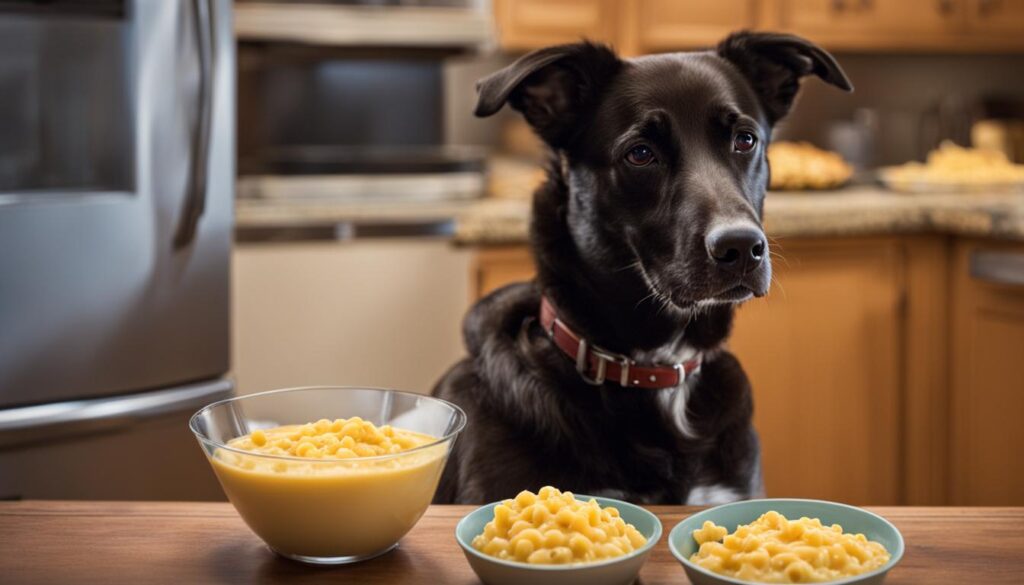
Feeding mac and cheese to dogs regularly can lead to several health risks. Dogs with dairy intolerance may experience gastrointestinal issues after consuming dairy products like cheese. The high fat content in mac and cheese can contribute to obesity and increase the risk of pancreatitis. It is essential to be cautious of harmful ingredients such as artificial flavors, colors, and added spices.
In dogs with dairy intolerance, the lactose found in cheese can be difficult to digest, leading to symptoms such as diarrhea, gas, and bloating. It is important to note that while some dogs may tolerate small amounts of dairy, others may have a more severe reaction. Therefore, it is best to avoid feeding mac and cheese to dogs with dairy intolerance altogether.
The high fat content in mac and cheese can have detrimental effects on a dog’s health. Dogs that consume excessive amounts of fat are at a higher risk of developing obesity, which can lead to a range of health issues, including joint problems, heart disease, and diabetes. Additionally, the rich and fatty nature of mac and cheese can increase the risk of pancreatitis, a painful inflammation of the pancreas.
Mac and cheese often contain harmful ingredients such as artificial flavors, colors, and added spices. These additives can irritate a dog’s gastrointestinal tract and potentially trigger allergies or other adverse reactions. It is crucial to read the ingredient labels carefully and avoid feeding mac and cheese that contains these harmful additives to ensure the well-being of your furry friend.
To summarize, regularly feeding mac and cheese to dogs can pose various health risks, including dairy intolerance, obesity, pancreatitis, and exposure to harmful ingredients. It is advisable to opt for healthier and dog-friendly alternatives to ensure your dog’s nutritional needs are met and their overall health is maintained.
| Health Risks of Feeding Dogs Mac and Cheese | Symptoms |
|---|---|
| Dairy Intolerance | Gastrointestinal issues such as diarrhea, gas, and bloating |
| Risk of Obesity | Increased weight gain and potential development of other health issues |
| Pancreatitis | Inflammation of the pancreas leading to abdominal pain and digestive problems |
| Harmful Ingredients | Potential irritations, allergies, or adverse reactions |
Mac and Cheese Alternatives for Dogs

When it comes to treating your dog, there are plenty of delicious and nutritious options that are healthier than mac and cheese. By incorporating these alternatives into their diet, you can provide them with the essential nutrients they need while keeping them happy and satisfied. Here are some dog-friendly treats that you can consider:
1. Fruits and Vegetables
Incorporating fruits and vegetables into your dog’s diet is a great way to provide them with vitamins, minerals, and fiber. Some dog-friendly options include:
- Bananas: Rich in potassium and natural sugars, bananas make for a tasty and healthy treat.
- Apples: Remove the seeds and core, and your dog can enjoy the benefits of antioxidants and a crunchy snack.
- Pumpkin: A great source of fiber and beta-carotene, pumpkin can aid in digestion and promote a healthy coat.
- Bell Peppers: Packed with vitamin C and antioxidants, bell peppers are a flavorful addition to your dog’s treats.
2. Lean Protein Options
Lean protein is essential for your dog’s muscle development and overall well-being. Consider adding the following options to their diet:
- Plain Boiled Chicken: A lean and easily digestible protein source that can be served as a treat or added to their regular meals.
- Fish: Cooked fish like salmon or cod provides omega-3 fatty acids, which are beneficial for your dog’s skin and coat.
Remember to remove any bones and seasonings before offering these alternatives to your dog. The proper preparation and portion control of these treats are essential to maintaining a balanced diet for your furry friend.
By choosing healthy treats and incorporating dog-friendly fruits, vegetables, and lean proteins into their diet, you can ensure that your dog receives the necessary nutrients while avoiding the potential risks associated with mac and cheese. It’s always a good idea to consult with your veterinarian for personalized recommendations tailored to your dog’s specific dietary needs.
The Composition of Mac and Cheese and Its Effects on Dogs’ Health
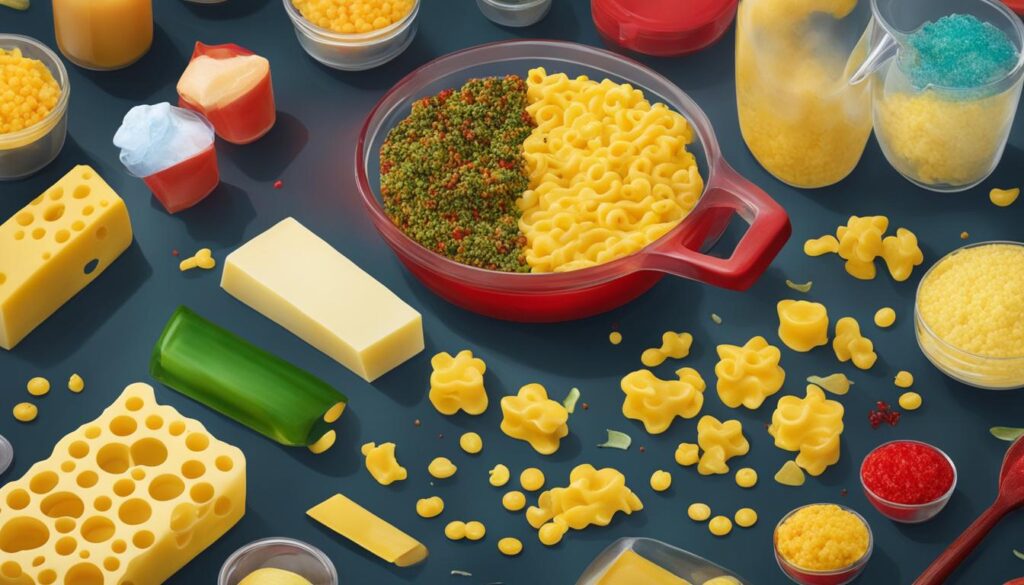
When it comes to mac and cheese, the ingredients used can have a significant impact on a dog’s health. Let’s take a closer look at some key factors:
Sugar in Macaroni
Macaroni, a main ingredient in mac and cheese, often contains added sugar. Consuming high amounts of sugar can contribute to obesity in dogs, leading to various health issues such as diabetes, joint problems, and decreased lifespan.
Gluten Intolerance in Dogs
Wheat-based pasta used in mac and cheese contains gluten, which can be problematic for dogs with gluten intolerance. Consuming gluten can trigger gastrointestinal issues, such as diarrhea, vomiting, and stomach discomfort. It is important to consider alternative options for dogs with gluten sensitivities.
Artificial Ingredients in Boxed Mac and Cheese
“The boxed mac and cheese products often contain artificial flavors and colors, which can have adverse effects on dogs.”
Boxed mac and cheese products commonly contain artificial additives, flavors, and colors. These artificial ingredients can be harmful to dogs, potentially causing allergic reactions, digestive problems, and overall discomfort. It is essential to opt for natural and minimally processed food options for our furry friends.
Phthalates in Cheese Products
Cheese, a key component of mac and cheese, has been found to contain phthalates, which are harmful industrial chemicals. Phthalates can have adverse effects on dogs’ endocrine system and overall health. It is important to be aware of the quality of cheese used in mac and cheese and choose varieties that are free from potentially harmful substances.
It is crucial to prioritize our dogs’ health by considering the composition of their food. While mac and cheese may be a beloved comfort food for us humans, the ingredients and their effects on dogs’ health should not be overlooked.
Summary
| Composition | Effect on Dogs’ Health |
|---|---|
| Sugar in Macaroni | Contributes to canine obesity |
| Gluten Intolerance | May cause gastrointestinal issues |
| Artificial Ingredients | Potential allergic reactions and digestive problems |
| Phthalates in Cheese | Harmful effects on endocrine system |
The Risks of Feeding Dogs Mac and Cheese
Feeding mac and cheese to dogs can pose several risks. Dogs with lactose intolerance may experience digestive upset, including vomiting and diarrhea, when consuming dairy products like cheese. Gluten intolerance can also cause adverse reactions in dogs, such as vomiting, gassiness, and skin irritations. Furthermore, heavily processed and boxed mac and cheese may contain artificial ingredients that can lead to gastrointestinal issues in dogs.
It’s important to understand the potential health effects of feeding dogs mac and cheese. Lactose intolerance in dogs can cause discomfort and digestive problems. Dogs lack the necessary enzymes to break down lactose, the sugar found in milk and dairy products. When dogs consume mac and cheese, which often contains cheese as an ingredient, it can result in gastrointestinal distress.
Gluten intolerance, also known as gluten sensitivity or celiac disease, can also pose risks when dogs consume mac and cheese. Gluten is a protein found in wheat and related grains, and dogs with gluten intolerance may have adverse reactions to these ingredients. Symptoms can include digestive issues, such as vomiting and diarrhea, as well as gassiness and skin irritations or rashes.
In addition to lactose and gluten concerns, heavily processed and boxed mac and cheese may contain artificial ingredients that can be harmful to dogs. These artificial additives, such as flavors, colors, and preservatives, can potentially cause gastrointestinal upset and other health issues in dogs.
To prioritize your dog’s health and well-being, it’s best to avoid feeding mac and cheese altogether. Instead, opt for healthier alternatives and dog-friendly treats that provide nutritional benefits without the risks associated with mac and cheese. Consulting with a veterinarian can help ensure that you’re making the best dietary choices for your dog.
| Risks of Feeding Dogs Mac and Cheese: | Potential Effects: |
|---|---|
| Lactose Intolerance | Gastrointestinal upset, vomiting, diarrhea |
| Gluten Intolerance | Vomiting, gassiness, skin irritations |
| Artificial Ingredients | Gastrointestinal upset, potential health issues |
Care for Dogs That Have Consumed Mac and Cheese
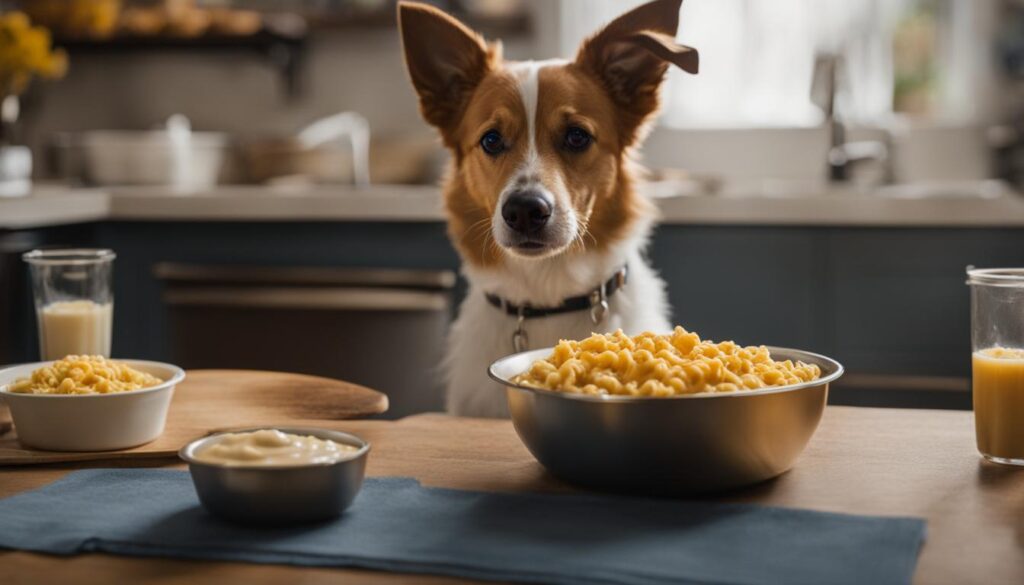
If your dog has consumed mac and cheese, it is important to monitor their energy levels and bowel movements. Dogs may experience gastric distress, including vomiting and diarrhea, after consuming a large amount of mac and cheese. It is essential to provide them with access to fresh water for hydration and frequent opportunities to relieve themselves outdoors.
If your dog is displaying symptoms of gastric distress, such as persistent vomiting or diarrhea, it is recommended to seek veterinary advice. A veterinarian can provide guidance on managing their discomfort and offer appropriate treatment if necessary.
Dogs that have consumed mac and cheese may be at risk of dehydration due to increased fluid loss from gastrointestinal upset. Ensuring they stay hydrated is crucial for their well-being. You can encourage your dog to drink by providing clean, fresh water and monitoring their water intake.
In cases where the symptoms persist or worsen, it is important to consult a veterinarian. They can assess your dog’s condition, provide a proper diagnosis, and recommend appropriate measures to manage gastric distress. Veterinary guidance is essential to ensure your dog’s health and well-being.
History and Fun Facts about Mac and Cheese
Mac and cheese is a beloved dish with a rich history and fascinating origins. Its roots can be traced back to an Italian cookbook from the 14th century, where a recipe for macaroni and cheese-like dish was recorded. However, it wasn’t until the 18th century that mac and cheese gained popularity in the United States.
One of the key figures responsible for introducing mac and cheese to American cuisine was none other than Thomas Jefferson. During his time in France, Jefferson encountered this delightful dish and was captivated by its flavors. Upon returning to the United States, he brought back a macaroni machine and introduced mac and cheese to his fellow Americans.
Since then, mac and cheese has become a staple comfort food in the United States and has enjoyed widespread popularity. Its creamy and cheesy goodness continues to be celebrated by people of all ages. Whether it’s homemade or enjoyed at a restaurant, mac and cheese holds a special place in the hearts and palates of many.
H3: Fun Fact
Did you know that mac and cheese is so beloved in the United States that it even has its own national day? National Mac and Cheese Day is celebrated on July 14th each year, giving people an opportunity to indulge in this delicious dish and honor its mouthwatering legacy.
| Origin | An Italian cookbook from the 14th century |
|---|---|
| Popularity in the United States | Introduced by Thomas Jefferson in the 18th century |
| Significance | A beloved comfort food with a dedicated national day |
Why Mac and Cheese is Unhealthy for Dogs
When it comes to our furry friends, it’s crucial to prioritize their health and well-being. While mac and cheese may be a delicious and comforting treat for us humans, it is not a suitable choice for dogs. Here’s why:
Seasonings and Oils in Mac and Cheese
Mac and cheese often contains seasonings and oils that can be harmful to dogs. Common seasonings like garlic and onion powder can cause digestive issues and even lead to anemia in dogs. Additionally, the high oil content in mac and cheese can contribute to weight gain and potentially lead to pancreatitis, a serious condition in dogs.
Dairy and Gluten Intolerance in Dogs
Many dogs are lactose intolerant and have difficulty digesting dairy products, including cheese. Feeding mac and cheese to dogs with lactose intolerance can result in gastrointestinal discomfort, such as diarrhea and gas. Furthermore, dogs with gluten intolerance can experience adverse reactions when consuming wheat-based pasta commonly found in mac and cheese.
It’s important to remember that every dog is different, and while some may tolerate small amounts of mac and cheese without any issues, it’s generally best to avoid feeding this dish to dogs altogether.
Image: Health effects of mac and cheese on dogs.
Instead of mac and cheese, there are plenty of healthier alternatives to treat your dog. Consider offering them nutritious fruits and vegetables like apples, carrots, and green beans. Lean protein sources such as cooked chicken or fish can also be a tasty and nutritious option for your furry friend.
Remember, if you have any concerns about your dog’s diet or are unsure about what foods are safe for them, it’s always best to consult with a veterinarian for professional advice tailored to your dog’s specific needs.
| Reasons Why Mac and Cheese is Unhealthy for Dogs | Impacts on Dogs |
|---|---|
| Seasonings and oils | Digestive issues, weight gain, pancreatitis |
| Dairy and gluten intolerance | Gastrointestinal discomfort, adverse reactions |
Healthy Alternatives to Mac and Cheese for Dogs
If you want to treat your dog, there are plenty of healthier alternatives to mac and cheese. Consider offering nutritious treats such as baked sweet potatoes, which are rich in vitamins and minerals. Dogs can also enjoy a variety of fruits and vegetables, including carrots and broccoli, which provide essential nutrients and fiber. For a protein-packed option, cooked fish and shrimp can be excellent choices that are low in fat and high in omega-3 fatty acids.
Here are some nutritious options for your furry friend:
- Baked sweet potatoes
- Carrots
- Broccoli
- Pineapple
- Bananas
- Cooked fish
- Cooked shrimp
These treats not only provide a variety of flavors, but also offer important vitamins, minerals, and antioxidants that contribute to your dog’s overall well-being. Remember to introduce new foods gradually and in moderation, especially if your dog has any specific dietary restrictions or allergies. Always consult with your veterinarian to ensure the treats you choose are suitable for your dog.
Feeding Guidelines:
When offering these alternatives to mac and cheese, it’s important to consider serving sizes. Treats should make up only a small portion of your dog’s diet, typically around 10% or less. The rest of their meals should consist of a balanced and complete dog food that provides all the necessary nutrients.
| Treat | Serving Size | Benefits |
|---|---|---|
| Baked sweet potatoes | Small, bite-sized pieces | High in fiber, vitamins, and antioxidants |
| Carrots | Sliced into sticks or grated | Crunchy texture promotes dental health; rich in beta-carotene |
| Broccoli | Steamed or lightly cooked florets | Rich in fiber, vitamins, and minerals |
| Pineapple | Small, bite-sized pieces | Contains bromelain, an enzyme that aids in digestion |
| Bananas | Sliced or mashed | Good source of potassium and vitamin C |
| Cooked fish | Boneless, skinless pieces | Provides lean protein and omega-3 fatty acids |
| Cooked shrimp | Deveined and shell-free | Low in fat and high in protein |
Wrapping Up
After careful consideration, it is evident that mac and cheese is not a suitable or healthy option for dogs. While dogs technically can consume mac and cheese, the ingredients and potential risks associated with this popular comfort food make it advisable to avoid feeding it to our furry friends.
Mac and cheese typically contain high levels of fat, sodium, and artificial ingredients that can be detrimental to a dog’s health. Dogs with lactose or gluten intolerance may experience digestive issues, including vomiting and diarrhea, after consuming dairy and wheat-based pasta.
Instead, it is essential to prioritize responsible feeding of human food to dogs. Opt for healthier treats that provide nutritional benefits, such as dog-friendly fruits and vegetables like bananas, apples, and pumpkin. Lean protein sources like plain boiled chicken or fish can also be excellent options to treat your dog while ensuring their well-being.
Always consult with your veterinarian before introducing any new foods into your dog’s diet. They can provide guidance tailored to your dog’s specific dietary needs and ensure a safe and balanced diet. By making informed choices and prioritizing your dog’s nutritional needs, you can help them lead a healthier and happier life.
FAQ
Is mac and cheese safe for dogs to eat?
While there is no definite yes or no answer, it’s important to be mindful of the ingredients and potential health risks. Traditional mac and cheese contains ingredients that are not suitable for dogs, such as high fat and sodium content, and may cause adverse reactions in dogs with gluten and dairy intolerances. It is recommended to consult a veterinarian before sharing any human food with your dog.
Why is mac and cheese not suitable for dogs?
Mac and cheese typically contains ingredients that can negatively impact a dog’s health. The high fat and sodium content can be detrimental, and dogs with gluten and dairy intolerances may experience adverse reactions. Additionally, mac and cheese may contain artificial flavors, colors, and added spices that can be problematic for dogs. It is advisable to prioritize your dog’s health and avoid feeding them this unhealthy dish.
When can dogs safely eat mac and cheese?
If your dog does not have any intolerances or allergies, they could enjoy a small portion of plain mac and cheese made with dog-safe cheese options such as cheddar or mozzarella. It is essential to ensure the mac and cheese has minimal salt and seasonings, such as garlic and onion powder. However, even in these cases, it is advisable to limit the serving size due to the high fat content.
What are the potential risks of feeding dogs mac and cheese?
Feeding mac and cheese to dogs regularly can lead to several health risks. Dogs with lactose intolerance may experience gastrointestinal issues after consuming dairy products like cheese. The high fat content in mac and cheese can contribute to obesity and increase the risk of pancreatitis. It is essential to be cautious of harmful ingredients such as artificial flavors, colors, and added spices.
Are there healthier alternatives to mac and cheese for dogs?
Yes, there are healthier alternatives to treat your dog. Some suitable options include fruits and vegetables like bananas, apples, pumpkin, and bell peppers. Lean protein sources such as plain boiled chicken and fish can also be given to dogs. It’s important to choose foods that provide nutritional benefits and improve your dog’s overall health.
What is the composition of mac and cheese and its effects on dogs’ health?
Mac and cheese typically contains ingredients that can negatively impact a dog’s health. The high sugar content in macaroni can contribute to canine obesity. Dogs with gluten intolerance may experience gastrointestinal issues when consuming wheat-based pasta. Boxed mac and cheese often contains artificial flavors and colors, which can be problematic for dogs. Additionally, cheese products can contain phthalates, harmful industrial chemicals.
What are the risks of feeding dogs mac and cheese?
Feeding mac and cheese to dogs can pose several risks. Dogs with lactose intolerance may experience digestive upset, including vomiting and diarrhea, when consuming dairy products like cheese. Gluten intolerance can also cause adverse reactions in dogs, such as vomiting, gassiness, and skin irritations. Furthermore, heavily processed and boxed mac and cheese may contain artificial ingredients that can lead to gastrointestinal issues in dogs.
How should I care for dogs that have consumed mac and cheese?
If your dog consumes mac and cheese, monitor their energy levels and bowel movements. It is normal for dogs to experience gastric distress, including vomiting and diarrhea, after consuming a large amount of mac and cheese. Ensure they have access to fresh water for hydration and provide frequent opportunities for them to relieve themselves outdoors. Seek veterinary advice if symptoms persist or worsen.
What are some history and fun facts about mac and cheese?
Mac and cheese has a long history, with its origins dating back to an Italian cookbook from the 14th century. It became popular in the United States after Thomas Jefferson encountered the dish in Paris and introduced it to American cuisine. Mac and cheese has remained a beloved comfort food throughout history.
Why is mac and cheese unhealthy for dogs?
Mac and cheese is not a healthy food choice for dogs. The seasonings, salt, and oils present in mac and cheese can cause digestive issues in dogs. Dogs with lactose or gluten intolerance may experience discomfort and negative health effects from consuming mac and cheese. It is essential to prioritize your dog’s health and avoid feeding them this unhealthy dish.
What are some healthy alternatives to mac and cheese for dogs?
If you want to treat your dog, there are plenty of healthier alternatives to mac and cheese. Consider offering baked sweet potatoes, raw or cooked vegetables like carrots and broccoli, or fruits like pineapple and bananas. Cooked fish and shrimp can also be excellent options for a nutritious treat. Consult with your veterinarian for more suggestions.
Can dogs have mac and cheese?
While dogs can technically eat mac and cheese, it is not a suitable or healthy option for them. The ingredients and potential risks associated with mac and cheese make it advisable to avoid feeding it to dogs. Instead, opt for healthier treats and prioritize your dog’s nutritional needs. Remember to consult your veterinarian before introducing any new foods into your dog’s diet.






